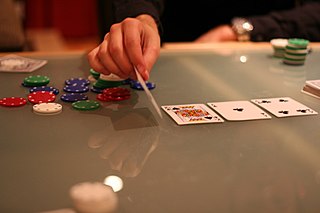
Poker is any of a number of card games in which players wager over which hand is best according to that specific game's rules in ways similar to these rankings. Often using a standard deck, poker games vary in deck configuration, the number of cards in play, the number dealt face up or face down, and the number shared by all players, but all have rules which involve one or more rounds of betting.
A poker player is drawing if they have a hand that is incomplete and needs further cards to become valuable. The hand itself is called a draw or drawing hand. For example, in seven-card stud, if four of a player's first five cards are all spades, but the hand is otherwise weak, they are drawing to a flush. In contrast, a made hand already has value and does not necessarily need to draw to win. A made starting hand with no help can lose to an inferior starting hand with a favorable draw. If an opponent has a made hand that will beat the player's draw, then the player is drawing dead; even if they make their desired hand, they will lose. Not only draws benefit from additional cards; many made hands can be improved by catching an out — and may have to in order to win.
In poker, pot odds are the ratio of the current size of the pot to the cost of a contemplated call. Pot odds are often compared to the probability of winning a hand with a future card in order to estimate the call's expected value.

In the card game of poker, a bluff is a bet or raise made with a hand which is not thought to be the best hand. To bluff is to make such a bet. The objective of a bluff is to induce a fold by at least one opponent who holds a better hand. The size and frequency of a bluff determines its profitability to the bluffer. By extension, the phrase "calling somebody's bluff" is often used outside the context of poker to describe situations where one person demands that another proves a claim, or proves that they are not being deceptive.

Texas hold 'em is one of the most popular variants of the card game of poker. Two cards, known as hole cards, are dealt face down to each player, and then five community cards are dealt face up in three stages. The stages consist of a series of three cards, later an additional single card, and a final card. Each player seeks the best five card poker hand from any combination of the seven cards of the five community cards and their two hole cards. Players have betting options to check, call, raise, or fold. Rounds of betting take place before the flop is dealt and after each subsequent deal. The player who has the best hand and has not folded by the end of all betting rounds wins all of the money bet for the hand, known as the pot.
In poker, the probability of each type of 5-card hand can be computed by calculating the proportion of hands of that type among all possible hands.
The fundamental theorem of poker is a principle first articulated by David Sklansky that he believes expresses the essential nature of poker as a game of decision-making in the face of incomplete information.
Every time you play a hand differently from the way you would have played it if you could see all your opponents' cards, they gain; and every time you play your hand the same way you would have played it if you could see all their cards, they lose. Conversely, every time opponents play their hands differently from the way they would have if they could see all your cards, you gain; and every time they play their hands the same way they would have played if they could see all your cards, you lose.
The following outline is provided as an overview of and topical guide to poker:

Badugi is a draw poker variant similar to triple draw, with hand-values similar to lowball. The betting structure and overall play of the game is identical to a standard poker game using blinds, but, unlike traditional poker which involves a minimum of five cards, players' hands contain only four cards at any one time. During each of three drawing rounds, players can trade zero to four cards from their hands for new ones from the deck, in an attempt to form the best badugi hand and win the pot. Badugi is an often gambling game, with the object being to win money in the form of pots. The winner of the pot is the person with the best badugi hand at the conclusion of play. Badugi is played in cardrooms around the world, as well as online, in rooms such as PokerStars. Although it doesn't have its own tournament per se at the WSOP, it is featured in the Dealers Choice events as well as in the Triple Draw Mix.

High Stakes Poker is a cash game poker television program which was broadcast by the cable television network GSN in the United States. The poker variant played on the show is no limit Texas hold 'em. The first 4 seasons ran from January 16, 2006 to December 17, 2007. The last 3 seasons ran from March 1, 2009 to May 21, 2011, and was simulcast in 3DTV on N3D.
Rake is the scaled commission fee taken by a cardroom operating a poker game. It is generally 2.5% to 10% of the pot in each poker hand, up to a predetermined maximum amount. There are also other non-percentage ways for a casino to take the rake. Some cardrooms will not take a percentage rake in any community card poker game like Texas hold 'em when a hand does not have a flop. This is called "no flop, no drop".
Cash games, also sometimes referred to as ring games or live action games, are poker games played with "real" chips and money at stake, often with no predetermined end time, with players able to enter and leave as they see fit. In contrast, a poker tournament is played with tournament chips worth nothing outside the tournament, with a definite end condition, and a specific roster of competitors.
Poker calculators are algorithms which through probabilistic or statistical means derive a player's chance of winning, losing, or tying a poker hand.

PokerTracker Software, LLC is the name of a poker tool software company that produces the popular PokerTracker line of poker tracking and analysis software. PokerTracker's software imports and parses the hand histories that poker sites create during online play and stores the resulting statistics/information about historical play into a local database library for self-analysis, and for in-game opponent analysis using a real-time Head-up display.
The following is a glossary of poker terms used in the card game of poker. It supplements the glossary of card game terms. Besides the terms listed here, there are thousands of common and uncommon poker slang terms. This is not intended to be a formal dictionary; precise usage details and multiple closely related senses are omitted here in favor of concise treatment of the basics.
Poker is a popular card game that combines elements of chance and strategy. There are various styles of poker, all of which share an objective of presenting the least probable or highest-scoring hand. A poker hand is usually a configuration of five cards depending on the variant, either held entirely by a player or drawn partly from a number of shared, community cards. Players bet on their hands in a number of rounds as cards are drawn, employing various mathematical and intuitive strategies in an attempt to better opponents.

Community card poker refers to any game of poker that uses community cards, which are cards dealt face up in the center of the table and shared by all players. In these games, each player is dealt privately an incomplete hand, which are then combined with the community cards to make a complete hand. The set of community cards is called the "board", and may be dealt in a simple line or arranged in a special pattern. Rules of each game determine how they may be combined with each player's private hand. The most popular community card game today is Texas hold 'em, originating sometime in the 1920s.
SitNGo Wizard is a poker tool software program to aid online poker players in determining their optimal betting actions during the late stages of Sit and go poker contests.

Shaun Frank Deeb is an American professional poker player from Troy, New York. He has three World Championship of Online Poker (WCOOP) player of the year titles and four World Series of Poker (WSOP) bracelets.
This is an alphabetical list of poker topics.






